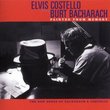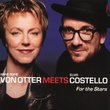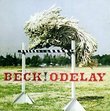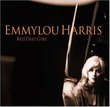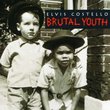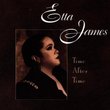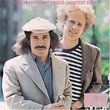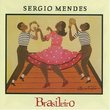| All Artists: Elvis Costello, Michael Tilson Thomas, London Symphony Orchestra Title: Elvis Costello: Il Sogno Members Wishing: 0 Total Copies: 0 Label: Deutsche Grammophon Release Date: 9/21/2004 Genres: International Music, Rock, Classical Styles: Europe, Britain & Ireland, Opera & Classical Vocal, Ballets & Dances, Ballets Number of Discs: 1 SwapaCD Credits: 1 UPCs: 028947157724, 0028947157724 |
Search - Elvis Costello, Michael Tilson Thomas, London Symphony Orchestra :: Elvis Costello: Il Sogno
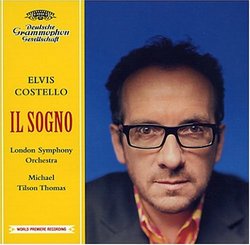 | Elvis Costello, Michael Tilson Thomas, London Symphony Orchestra Elvis Costello: Il Sogno Genres: International Music, Rock, Classical
British rock star Elvis Costello's score to Shakespeare's A Midsummer Night's Dream (Il Sogno was commissioned by an Italian ballet company, hence the title) is derived from the French impressionists, with touches of Duke ... more » |
Larger Image |
CD DetailsSynopsis
Amazon.com British rock star Elvis Costello's score to Shakespeare's A Midsummer Night's Dream (Il Sogno was commissioned by an Italian ballet company, hence the title) is derived from the French impressionists, with touches of Duke Ellington, George Gershwin, and Igor Stravinsky. Recurring saxophone riffs mirror orchestrations by Serge Prokofiev and Maurice Ravel, while eerie ripples of cimbolom (a folkloric hammered dulcimer) are straight out of Béla Bartok. Costello's use of leitmotif tidily depicts characters and subplots; the fairies come across as a jazzy, sexy lot whose intervention in human affairs is selfishly mean-spirited rather than playful. The four human lovers are flummoxed by their own callowness long before they encounter the supernatural. The nobles seem like posturing windbags while the plebian worker/players are ponderously endearing. The LSO and Michael Tilson Thomas exult in the work's textures and climaxes. Even though the milieu is more cinematic than symphonic, this beguiling confection is light-years beyond most pop-classical crossover attempts. --Christina Roden Similarly Requested CDs
|
CD ReviewsExquisite noiseradio | Arlington, TX United States | 09/28/2004 (4 out of 5 stars) "First, I don't usually like it when Elvis makes a non-rock record. I just greatly prefer This Year's Model to things like The Juliet Letters or Painted From Memory. But Il Sogno is different. He shows an amazing knack for classical composition. The work is consistently good throughout. He seems equally at home with more dissonant modern forms as with Gershwin-inspired jazz themes and Copeland-inspired Americana. All the elements blend well together into a cohesive whole. It's not a masterpiece, but it's much better than anyone could have reasonably expected. And the comparrisons to Gershwin and Copeland are compliments; while not as good as either of those composers' best works, I feel confident that neither composer would have been embarrased to have composed Il Sogno themselves. A worthwhile release." Surprisingly listenable, even enjoyable Michael Grabowski | Lake Forest, CA United States | 10/07/2004 (4 out of 5 stars) "Costello's previous work in orchestral settings--Juliet Letters, the GBH and Jake's Progress soundtracks, North--have been somewhat tolerable when they're not absolutely ponderous. Yet occasionally his left-field excursions work well--Painted From Memory, for instance--so I gave Il Sogno a chance. What do you know? It works fairly well. I can't speak to it's success as a ballet score but as a CD it sounds good. It acheives a sense of flow and drama that takes it from beginning to end. The themes and melodies are not at all awkward or strained like in Juliet Letters. If anything he seems to have borrowed from John Williams--but in a good way. Listen closely and you hear distinctly Costellan touches in some parts. There's nothing groundbreaking here but that's a good thing--he's not reaching beyond his grasp and the result is not as pretentious as other pop artists' work in this vein. I really don't want EC to spend too much time composing more works like this--stick with the rowdy rhythm records, Elvis--but for EC fans who are willing to give this a try, I think this will work." Classical, Shakespearean Costello Shifts Styles and Moods Ed Uyeshima | San Francisco, CA USA | 05/13/2005 (4 out of 5 stars) "This is quite an ambitious venture for even a proven Renaissance musician like Elvis Costello, an hour-long "story ballet" set to Shakespeare's fantasy comedy, "A Midsummer's Night Dream", for a full symphony orchestra. Certainly if the material is good enough for the likes of Felix Mendelssohn and Benjamin Britten, it's good enough for a former punk rocker with an insatiable curiosity and luckily for us, a talent to make deeply evocative music. Amazingly, Costello composed and orchestrated this work without assistance. It's an impressive series of pieces, not entirely integrated in its vision but nonetheless, powerfully evocative for what must have been a fascinating stage performance. His single-mindedness comes across most acutely in the hubris he displays in integrating jazz, big band and even Tin Pan Alley elements together into several of his pieces. The results are variable but always thoughtful and sometimes challenging.
For example, in the section called "The State of Affairs" near the beginning of Act I, Costello is trying to illustrate the fight between Egeus and his daughter Hermia over whom she should marry, Lysander or Demetrius. It's an interesting potpourri of styles as Costello goes from a lovely fanfare to a more madrigal-sounding passage that shifts over to another even bolder fanfare, which then moves into a moody, compelling orchestral passage and switches suddenly to a cool jazz section with vibraphone, and then finally ends with a tympani drum-led passage. Costello makes this hodgepodge work by staying attuned to the mood shifts of the characters. The same can be said for the section describing the fairy realm, "Oberon and Titania", that opens Act II. It starts with a gently medieval-sounding oboe, which leads to the complementary sounds of clarinet and strings, but then to illustrate the state of conflict between the two monarchs, Costello chooses to switch abruptly to a lengthy jazz passage complete with Ellington-like riffs that sounds unfortunately like George Benson's version of "On Broadway" cross-pollinated with Bernstein's "West Side Story". This is a case where it stays a hodgepodge. A more successful piece comes later with "Oberon Humbled", which Costello starts as a soft, strings-led reflective melody, which transitions into a more percussive middle section and then returns to the more swooning sound of the first part. This one works because the music changes are far more subtle. The hit-and-miss aspect runs throughout the piece, but you are often more bowled over by the sheer audacity and overriding drama that you can tolerate the sometimes jarring style shifts. The net effect feels more cinematic than symphonic, embodying scenes that reminds me a bit of Nino Rota's work in "The Godfather" films, Randy Newman's score for "The Natural" (especially in the aforementioned "Oberon Humbled") and during its excessive moments, even some of Douglas Sirk's melodramas from the 1950's. There is even a Coplandesque crescendo in Act III's concluding piece, "The Wedding", but Costello doesn't leave well enough alone as he delves back to what sounds like Bernstein's "On The Waterfront" for the finish. His attention to detail here makes the listener pay equal attention to every note. However, it's also the persnickety aspect of this approach that proves alienating at times and less than enthralling. Perhaps Costello can find a healthy compromise in this conflict in his next symphonic work. For the time being, we have this piece, flaws and all, and Costello certainly does not cut corners in presenting it here, as he has the estimable Michael Tilson Thomas leading the London Symphony Orchestra. But the lion's share of the credit must be given to the genre-unlimited Costello, who has taken a genuine artistic step forward in producing truly contemporary classical music that can stand with the works of Britten, John Adams and Philip Glass." |

 Track Listings (24) - Disc #1
Track Listings (24) - Disc #1
